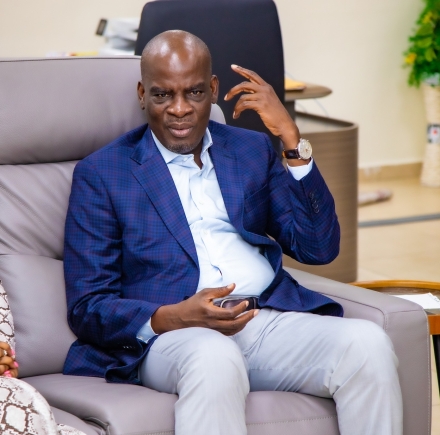The government's flagship No Academic Fee Policy for first-year tertiary students has recorded significant progress, with 129,054 applications received through the dedicated No-Fees-Stress portal as of June 17, the Minister of Education, Haruna Iddrisu, has announced.
Addressing journalists at the ministry's quarterly sector update at the Jubilee House last Wednesday, Mr Iddrisu revealed that out of the total applications, 107,429 students had completed the process while 22,592 had been validated for disbursement.
Out of 168 public tertiary institutions, 114 have submitted their enrolment data to facilitate the smooth implementation of the policy.
The minister's comprehensive update covered multiple areas of the government's education transformation agenda, including ongoing reforms following the National Consultative Review Forum on Education held last February.
The forum, which gathered over 5,000 memoranda from stakeholders, including a 20,000-respondent survey on the Free SHS Policy, has paved the way for significant policy directions.
Key among the emerging reforms is the strategic shift in school placement, where urban centres will transition to day-school models, while rural and deprived communities will see enhanced boarding facilities to address geographical barriers to education access.
This approach, the minister explained, aligned with the government's commitment to equitable education opportunities for all Ghanaian children, regardless of their location.
TVET
He said Technical and Vocational Education and Training (TVET) was receiving particular attention under the new reforms.
Contrary to its previous perception as a last resort, TVET is being repositioned as a premium alternative pathway.
The ministry is therefore finalising plans to establish a TVET Fund, which will support apprenticeship programmes and provide trainees with essential toolkits.
A Cabinet paper on this initiative is expected to be presented shortly.
The minister also highlighted the remarkable progress of the sanitary pad initiative, a GH₵290 million intervention, in collaboration with the Ministry of Gender and Social Protection.
This programme, he said, was addressing a critical but often overlooked barrier to girls' education, with initial reports indicating reduced absenteeism among female students since its implementation.
Basic education
On Basic Education, the ministry is tightening examination administration following isolated incidents of invigilator misconduct during the recent BECE.
While commending the generally successful conduct of the examination, which recorded over 603,000 candidates, Mr Iddrisu emphasised the government's zero-tolerance stance on examination malpractice.
Monitoring teams from the ministry and the Ghana Education Service (GES) conducted special visits to centres to ensure compliance with examination regulations.
Looking ahead, the ministry is preparing to establish an Education Reform Implementation Committee to oversee the execution of approved recommendations from the national forum.
A comprehensive Cabinet memorandum detailing infrastructure development plans, sustainable financing mechanisms and quality enhancement measures is in the works.
"These reforms represent our unwavering commitment to delivering on the President's vision of equitable, accessible and quality education for every Ghanaian child," Mr Iddrisu stated, assuring the public of regular updates on the implementation process.
The minister expressed appreciation to President John Dramani Mahama for his leadership in prioritising education and to all stakeholders who contributed to the comprehensive review process.
He particularly acknowledged the role of traditional leaders, teacher unions and civil society organisations in shaping the emerging reforms.
Mr Iddrisu said the government would significantly increase funding and resources for basic education in the upcoming budget to strengthen foundational learning, literacy, and the emotional well-being of children.
He emphasised that investing early in children’s education sets the trajectory for their future.
"If a child gets it right by age six, you can predict the quality of their life for the next 80 years," he stated.
The minister also disclosed that boards and councils of almost all public tertiary institutions had been inaugurated, ensuring academic freedom and non-interference in university management.
"The President has guaranteed full respect for institutional autonomy," he said.
However, four technical universities are yet to have their boards fully constituted due to their recent upgrade to full university status.
A new legal framework will be introduced in Parliament to formalise their governance structures.
Teacher promotions
Addressing long-standing concerns within the GES, the minister revealed that the President had directed the immediate promotion of qualified teachers who had been stuck in deputy director positions for over a decade.
"From deputy director to director levels, promotions will now be based on merit and tenure, not just vacancy availability," he explained.
The Public Services Commission has been tasked to fast-track the process to prevent further delays.
Mr Iddrisu acknowledged recent controversies surrounding teacher recruitment, clarifying that some appointments lacked financial clearance, while others were under audit.
"Once cleared, affected teachers will receive their appointment letters and salaries," he assured.
He also warned against fraudulent recruitment practices, vowing to investigate unauthorised portal entries onto the government payroll.
The minister reiterated plans to involve teacher associations in administrative decision-making to enhance school governance.
This follows recent developments in some schools where management challenges have arisen.

